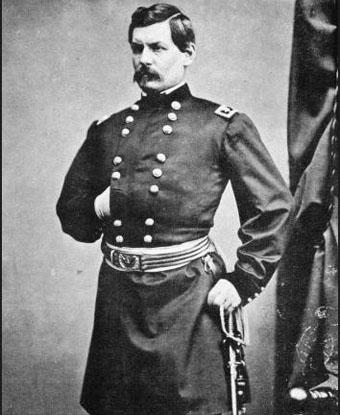Last updated: June 17, 2015
Person
George Brinton McClellan

Library of Congress
From the Peninsula to Maryland: McClellan's role in the summer of 1862
After his push toward Richmond was thwarted by Robert E. Lee in July, the Army of the Potomac began withdrawing back to Washington. When Lee responded by advancing North to try and end the "total war" of John Pope's Army of Virginia on the people of Northern Virginia, McClellan was ordered to send assistance to Pope from the Army of the Potomac McClellan was slow to respond, sending only minimal reinforcements, even when directly ordered to do so, and delaying their arrival on the battlefield of the Second Battle of Manassas (Bull Run).
His failure to properly support Pope greatly benefited the Confederates. With Longstreet's arrival and subsequent attack on Pope's position the Confederates carried the day on August 30, 1862, once again driving the Union soldiers back to Washington.
Despite McClellan's failure to support Pope at Manassas, when Lincoln reorganized Federal forces, consolidating Pope's Army of Virginia into the Army of the Potomac, he decided to reappoint McClellan as the head of the new force.
When Lee launched an invasion into Maryland in September 1862, McClellan, in rare exception to his usual slowness of action, rapidly led the Army of the Potomac northwest to cut him off in Maryland. Fortune favored McClellan when one of his soldiers discovered a copy of Special Orders 191 near Frederick, Maryland. These orders outlined Lee's plans and revealed that he had split up his army, providing McClellan with a splendid opportunity to destroy Lee's army in piecemeal.
Recognizing the significance of the opportunity McClellan declared, "Here is a paper with which if I cannot whip Bobbie Lee, I will be willing to go home." He quickly sent a telegraph to President Lincoln in which he stated, "I have all the plans of the rebels, and will catch them in their own trap if my men are equal to the emergency." Yet, after sending this message at noon on September 13, rather than ordering his army to set out to engage the disparate elements of Lee's forces immediately, he awaited further reconnaissance and ordered them to depart the following morning. This eighteen hour delay allowed Lee time to react and take action to consolidate his forces to meet the Union threat. Though it is often asserted that Lee received intelligence from a Confederate sympathizer that McClellan knew of his plans, Lee himself stated that he was unaware that McClellan had a copy of the orders until a year later when McClellan published his account of the campaign.
The delay in McClellan's response to the opportunity provided by Special Orders 191 helped to secure the fate of the federal garrison at Harpers Ferry since the relief column McClellan dispatched on the morning of September 14 was unable to reach them before they surrendered to "Stonewall" Jackson. It also allowed Lee to successfully defend the passes at South Mountain long enough for the full strength of the Army of Northern Virginia to arrive on the field of Antietam on September 17.
Despite the tactical advantages and numerical superiority McClellan enjoyed at the Battle of Antietam, he failed to utilize many of the means available to him, achieving an inconclusive outcome on the battlefield where he might have had a clear victory. He committed only 50,000 of the available men to the contest which meant that a third of his army never even fired a shot.
On the morning of September 18, Lee's army prepared to defend against a Federal assault that never came. Since McClellan did not attack, that night, under the cover of darkness, Lee's campaign into Maryland came to an end when his army withdrew across the Potomac River into Virginia.
Despite repeated entreaties from the War Department and the president himself, McClellan declined to pursue Lee once after his initial push was stopped at Shepherdstown on September 19. Following this repulse McClellan remained in place for more than 5 weeks, finally beginning to move again on October 26.
This failure was the final straw for Abraham Lincoln who relieved McClellan of his command of the Army of the Potomac on November 7, effectively ending the general's military career.
